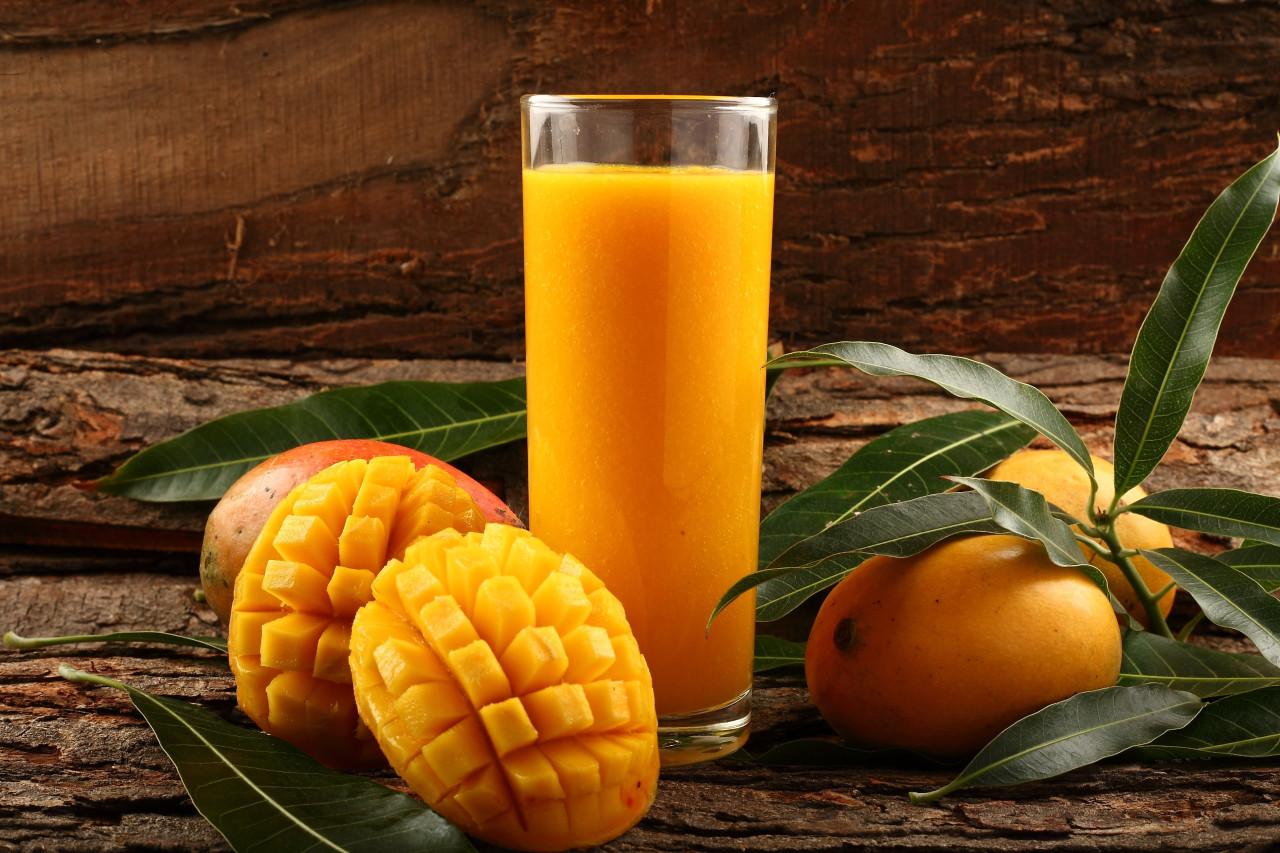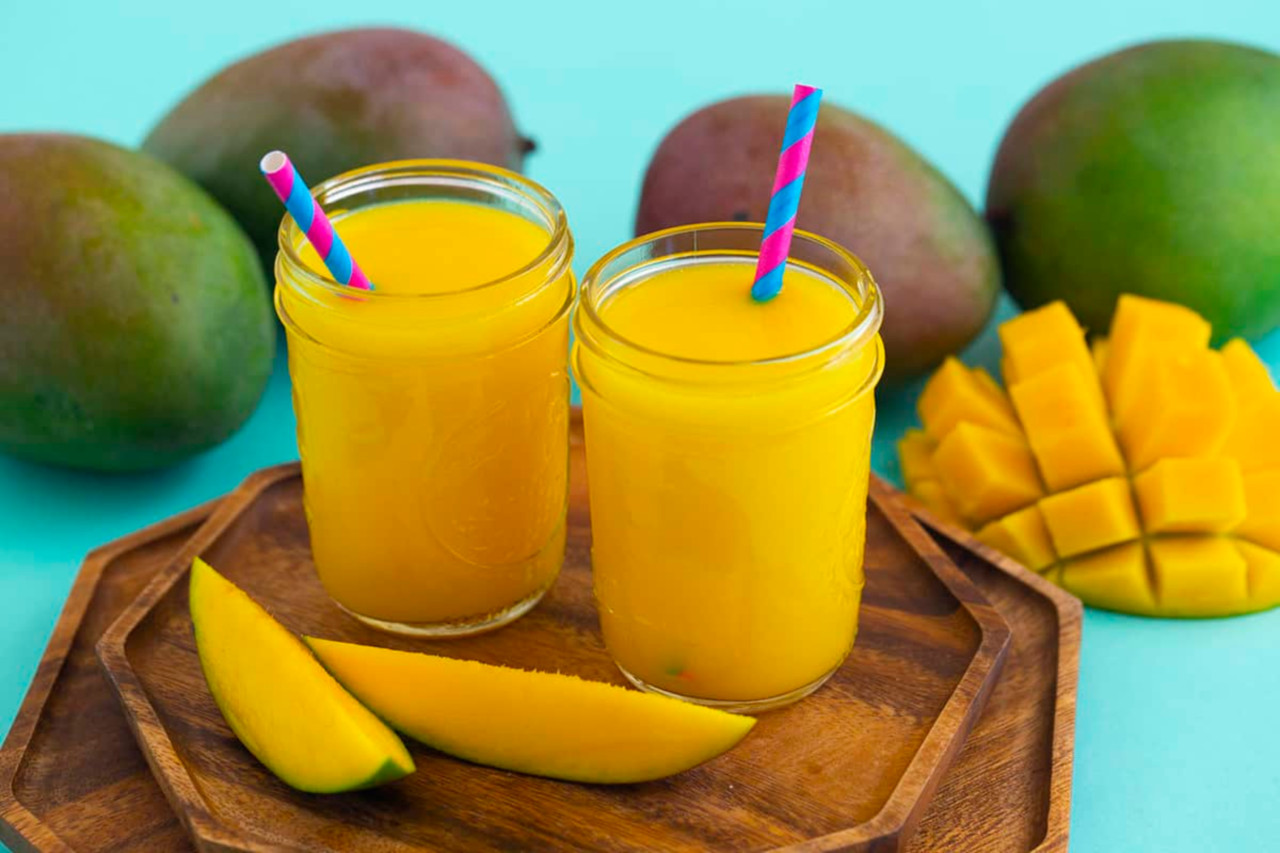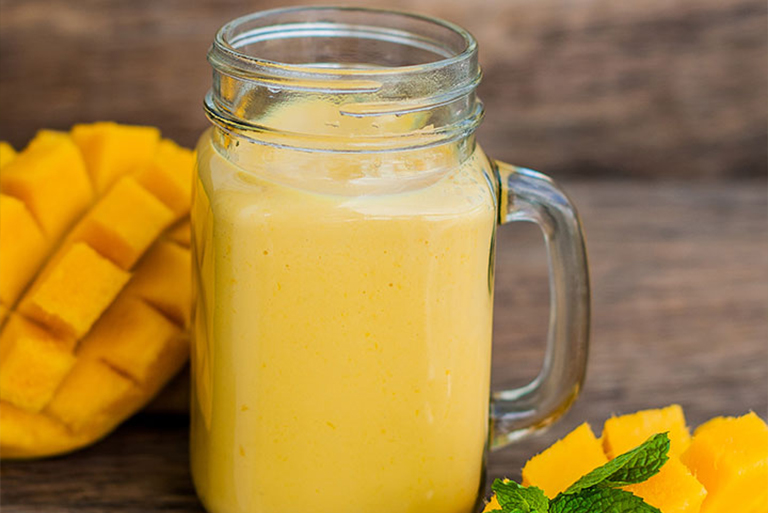Mango juice offers a delicious way to reap the nutritional benefits of mango juice. Mangoes are bursting with vitamins, minerals and other plant compounds that have positively impacted our health and well-being. In this article, we’ll take a closer look at the nutrients in mango juice and discuss the most well-researched health effects of this fruit juice.
Mango juice is packed with nutrients
First, to quickly understand the benefits of mango juice, let’s quickly learn about the nutritional composition of this fruit. Mango juice contains an impressive range of vitamins, minerals and other phytonutrients. One 8-ounce serving provides:
- Vitamin C (over 30% of the RDI): A powerful antioxidant that supports immune function and collagen synthesis.
- Vitamin A (15% RDI): Crucial for vision, cell growth and immune health.
- Copper (10% RDI): Necessary for red blood cell formation and maintaining bone and nerve health.
- Vitamin B6 (10% RDI): Important for energy production, red blood cell formation and brain health.
On top of these essential nutrients, this fruit juice drink is also a good source of potassium, manganese and dietary fiber. The fiber content helps slow digestion and nutrient absorption for stable blood sugar levels. Potassium supports heart health by balancing sodium levels.

Benefits of mango juice for healthy
Prevents Cancer
Mango contains antioxidant compounds, including astragalin, methyl gallate, isoquercitrin, fisetin, quercetin and gallic acid. All these compounds are considered to be effective in reducing the risks of breast, colon, leukaemia and prostate cancers. A soluble dietary fibre, ‘pectin’, present in mangoes, also plays a significant role. According to the latest research, pectin trims down the action of “galectin 9”, a functioning element in cancerous cells. Furthermore, another constituent of mangoes, “lupeol”, suppresses the tumour cells of prostate cancer.
Lowers cholesterol levels
Mango juice has many benefits in lowering cholesterol levels because of its high fiber and antioxidant content. One of the main substances in mango juice is fiber, which helps reduce LDL cholesterol levels, often referred to as “bad” cholesterol. Fiber binds to cholesterol in the digestive system, and fiber aids in cholesterol excretion, lowering overall cholesterol levels.
Additionally, mango juice is rich in antioxidants such as vitamin C and beta-carotene, which can prevent oxidative stress and inflammation, factors that contribute to heart disease. These antioxidants support heart health by improving blood vessel function and reducing the risk of plaque buildup in the arteries.
Lower cholesterol levels can lead to a reduced risk of heart disease and improved overall heart health, making mango juice a beneficial addition to a heart-healthy diet.
Maintains Blood Pressure
The high potassium, magnesium, and antioxidant content of mango juice provide many benefits in maintaining healthy blood pressure levels. Potassium is an important mineral that helps regulate blood pressure by counteracting the effects of sodium. It promotes the excretion of excess sodium through urine, which helps relax blood vessel walls, preventing hypotension.
Magnesium is important in supporting blood vessel relaxation and improving blood circulation. This mineral also contributes to maintaining a normal heart rhythm, promoting cardiovascular health. Additionally, the antioxidants found in mango juice, such as vitamin C and beta-carotene, fight oxidative stress and inflammation, which can negatively affect blood pressure and overall cardiovascular health.

For eye health
Mango juice is particularly beneficial for eye health due to its high content of vitamins A and C and various antioxidants. Vitamin A is important for maintaining good vision, as it plays a key role in forming rhodopsin, a pigment in the retina that helps the eye adapt to low light conditions. Vitamin A deficiency can lead to night blindness and other vision problems, so vitamin A in mango juice is important for eye health.
The antioxidants found in mango juice help protect the eyes from oxidative stress. These compounds neutralize free radicals, damaging eye cells and contributing to age-related conditions such as cataracts and macular degeneration.

Clears the skin
One of the best benefits of mango juice is that it enhances the beauty of your skin by providing essential nutrients in significant quantities. Acne, pimples and other skin issues can be treated externally using mango fruit. You must apply the mango pulp on your skin for about ten minutes. After the recommended time, wash your skin with tepid water.
Alkalizes the whole body
Mango juice offers several benefits for alkalizing the body, primarily due to its rich composition of key nutrients and compounds. One of the main substances is vitamin C, a potent antioxidant that neutralizes acidity and supports immune health. Essential minerals like potassium and magnesium also play significant roles in this alkalizing process. Potassium helps to regulate fluid balance and counteract acidic conditions, while magnesium is involved in numerous biochemical reactions that influence the body’s pH levels.
This alkalizing effect benefits the body as it can enhance overall health by improving energy levels, supporting digestion, and bolstering the immune system. A balanced pH level is crucial for preventing chronic diseases of high acidity, such as metabolic disorders and inflammation.
Fights diabetes
Diabetes is a severe ailment that cannot be considered trivial. A surplus quantity of blood sugar characterizes it in the body. The most common causes of diabetes include high blood pressure, high cholesterol and insulin resistance. Mango juice (without sugar) controls sugar levels by normalizing insulin levels, maintaining blood pressure and reducing bad cholesterol.
Improves digestion
When experiencing digestive issues like constipation or an upset stomach, consuming mango juice alongside grapefruit and pineapple juices can provide a combination of soothing properties, enzymes, and hydration that may help alleviate symptoms.
Incorporating mango juice into a well-balanced diet that includes a variety of fruits, vegetables, whole grains, and adequate water intake can contribute to overall digestive health and promote regularity.
Boosts the immune system
With vitamin C, vitamin A, and carotenoid content, this juice will help your immune system’s resilience and efficiency in warding off illnesses and infections. However, it’s important to note that while mango juice contributes to immune health, it should be part of a well-rounded diet that includes a variety of other fruits, vegetables, and immune-boosting foods to provide a comprehensive range of nutrients for optimal immune function.

Promote heart health is one of the excellent benefits of mango juice
One of the most well-researched health benefits of mango juice is its ability to support cardiovascular function. This is mainly due to its antioxidant compounds and vitamin/mineral profile. Specifically:
- Potassium: Helps regulate blood pressure by counteracting the effects of sodium. High blood pressure is a significant risk factor for heart disease and stroke.
- Vitamin C: Protects LDL (“bad”) cholesterol from oxidation, which prevents plaque buildup in the arteries. Oxidized LDL is much more likely to cause blockages.
- Dietary Fiber: Lowers total and LDL cholesterol levels when consumed as part of a healthy diet. High cholesterol increases heart disease risk over time.
- Carotenoids: Plant pigments like beta-carotene and alpha-carotene that function as antioxidants in the body. They help prevent oxidation damage to cholesterol.
It’s important to note that while mango juice offers these health benefits, it is also relatively high in natural sugars. Therefore, moderation should be exercised, especially for individuals with diabetes or those watching their sugar intake.
Incorporating mango juice into a balanced diet can be a delightful way to enjoy the benefits of mango juice while relishing its tropical and refreshing taste.
